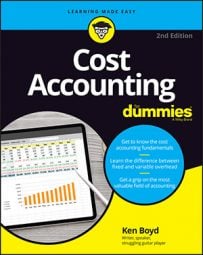In cost accounting, process costing assumes that all units produced are identical. When spoilage creates costs in a process-costing environment, you apply the following methods to account for them.
Cost accounting for abnormal spoilage
Accountants post the cost of abnormal spoilage to a “loss for abnormal spoilage” account. The loss isn’t related to cost of goods manufactured. Instead, abnormal spoilage is a separate cost that you can’t recover.
As a result, abnormal spoilage isn’t included as a product cost. So break it out first. Your accountant will put the cost in a loss account separate from costs of manufacturing. When you determine that a cost represents abnormal spoilage, you recognize a loss — and you’re all done with that part.
Cost accounting for normal spoilage
Costing normal spoilage takes a little math. You add spoilage costs to cost of goods manufactured. Now consider how costs are assigned using process costing.
As units move from one production department to another, the costs move along with them. Process costing uses equivalent units to account for units that are partially complete. The percentage of completion for material cost might be different from conversion costs, and vice versa. Equivalent units even things out. The goal is for each equivalent unit to have the same amount of costs attached to it.
Some of your equivalent units will be spoiled. Maybe you’re running production of 10,000 magazines. As you inspect the magazines for defects, you notice that 10 magazines have pages that were printed incorrectly. Those magazines aren’t sellable to customers. Because you expect some spoilage (due to the limits of your machine’s capability), the ten magazines are considered normal spoilage. Normal spoilage adds costs to your goods.
So you have a choice when accounting for normal spoilage. You can include the spoiled units in your calculation of physical units and equivalent units, or you can exclude them.

